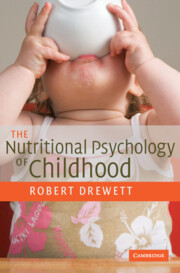Book contents
- Frontmatter
- Contents
- List of illustrations and table
- Preface
- 1 Introduction
- 2 The development of feeding behaviour: infancy
- 3 The development of feeding behaviour: weaning onwards
- 4 Born too small or born too soon
- 5 Nutritional deficiencies
- 6 Nutritional aspects of some physical conditions
- 7 Failure to thrive
- 8 Adiposity and obesity
- 9 Adolescence and the eating disorders
- 10 Some concluding thoughts
- References
- Index
7 - Failure to thrive
Published online by Cambridge University Press: 22 September 2009
- Frontmatter
- Contents
- List of illustrations and table
- Preface
- 1 Introduction
- 2 The development of feeding behaviour: infancy
- 3 The development of feeding behaviour: weaning onwards
- 4 Born too small or born too soon
- 5 Nutritional deficiencies
- 6 Nutritional aspects of some physical conditions
- 7 Failure to thrive
- 8 Adiposity and obesity
- 9 Adolescence and the eating disorders
- 10 Some concluding thoughts
- References
- Index
Summary
Criteria for failure to thrive and its epidemiology
In the UK and many other countries infants are weighed at intervals through the first year of life. Figure 7.1 shows the weights of an infant recorded in the first year and plotted on a chart. The lines on the chart are intended to represent the distribution of weights of infants in the UK as a whole over the first year of life. Because the distribution differs in boys and girls, boys and girls have different charts. This was a boy. At birth his weight lay almost exactly on the 50th centile, i.e. it was very close to the average for British boys. But his weight gain over the first year was very slow. By 6 weeks he was below the 2nd centile. Only one or two boys in 100 would weigh less. By a year he was on the 0.4th centile. Only three or four in 1000 would weigh less.
If this were your child, you would probably be worried. Certainly your health visitor would be. But what is there, exactly, to be worried about? One possibility is that the child is ill. Poor weight gain in infancy can be a sign of a previously undetected physical illness – of cystic fibrosis, for example. Often, however, it is not, at least in societies in which health and health care are generally good. But if the child is not ill, poor weight gain is usually due to inadequate food intake.
- Type
- Chapter
- Information
- The Nutritional Psychology of Childhood , pp. 123 - 147Publisher: Cambridge University PressPrint publication year: 2007



